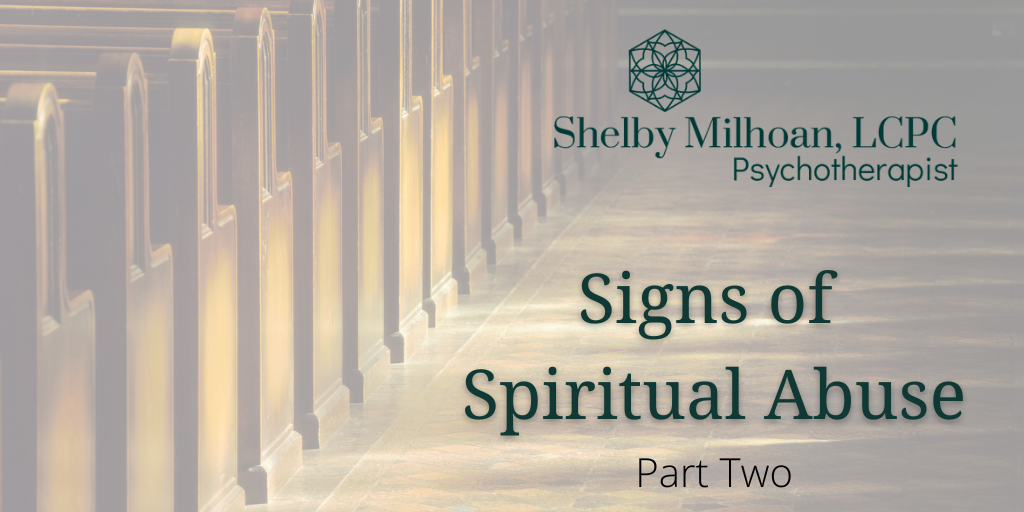
Signs of Spiritual Abuse—Part Two
To read the first part of this series, click here.
Minimizing, Denying, and Blaming
This can come in many forms, including spiritual bypass, denying, or minimizing an authentic emotional or behavioral experience. Members may state things like “Everything happens for a reason.” Or “the lord works in mysterious ways.” Or “Let go and let God.” This tells the person that the way they feel or behave is incorrect or that they must stop dwelling on it and move on. Gaslighting, or making a member think that what they have experienced is “wrong” or “crazy,” and denial of mistreatment are also seen in high-control religions. If a member feels uncomfortable with a passage in the holy book or rule set by leaders, the other members may say they are “straying” or “unenlightened.” You may also see the justification for abuse. For example, a member may be in an abusive relationship with their spouse. Upon going to elders in the group, the member is told that it is God’s plan and that they must change something to improve the relationship. Overall, if the deity ordains it, it isn’t considered abuse. Victim blaming also falls into this category. Members may ask someone who shares about a crisis, “Well, did you bring this on yourself by sinning?” or “Maybe you lacked faith, and that is why God isn’t answering your prayers.” This tells the member in crisis, “If I were just good enough or faithful enough, then I wouldn’t be suffering.” “I can’t blame God or the group, only myself.” There may also be required forgiveness or reconciliation in religions of high control, i.e., “You must forgive because it is godly, no matter the crime.”
Loss of Autonomy
This may be one of the hallmark signs of religious power and control. Within these groups, there is an overall suppression of intuition and critical thinking skills. A member’s intuition may tell them that what is happening within the group is unhealthy. However, the group continues to maintain its point, leading to the members’ only options being to suppress their emotions and urges or leave. Often, the group members see themselves as enlightened. Because they are enlightened, they are above their sensations and emotional experiences and receive all their messages from elders or the divine, thereby not utilizing critical thinking skills. There is an overreliance on the group for emotional support, social engagements, and finances. There is also a denial of privacy through accountability groups, audits, “giving collateral,” or other tactics. In these activities, members are made to give out personal information to be used against them. Overall, there is a submission to authority and a learned belief that the member is not an authority over themselves and that they must default to other members or divine authority to make significant life decisions. This can leave individuals who are thinking about leaving or who have left a high-control religion feeling indecisive and anxious about everyday life decisions.
Definition of Gender and Sexuality
In high-control religions and other groups, there are often rigid and binary gender roles. If members don’t fit into these roles perfectly, they are shamed, punished, or excluded from the group. Often, women are the recipients of subjugation, and there are strict limits around sex and marriage. In addition, there is a pathologizing of queer identities. These groups may use propaganda such as “The Gay Agenda” to make others afraid of gay people.
Economic control
Financial investment requirements, such as offerings, tidings, or giving up a percentage of one’s salary to the group, feel required, not optional. Members may make interpretations about big financial wins within the group (i.e., “We prayed for this!). Also seen are restricted education and employment opportunities, mainly for women. Working outside the home may be seen as “bad” or against the will of God. Members may also shame others for “worldliness,” or enjoying things outside of the group. Often, members who want something outside the group are seen as lesser than others. In some groups, members are required to share their finances under the guise of mentorship when it is about control.
The wheel outlines signs of spiritual abuse that can be seen in high-control religions and other groups high-control groups. These signs of abuse can be difficult for individuals who have been abused to realize, especially if they are still involved with the group. Denial and fear are everyday experiences of members on the fence about leaving their faith.
Remember that religion in itself is not bad and that religious institutions have helped many people live peaceful and happy lives. However, if someone you know or yourself notices some of the patterns listed above within their religious group, please consider meeting with a licensed therapist to speak more about it.

Shelby Milhoan, LCPC
